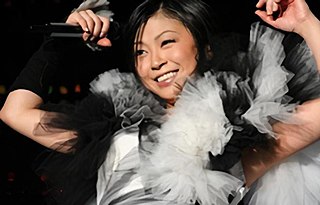
Hikaru Utada, also known by the mononym Utada, is a Japanese-American pop singer, songwriter and producer. Utada is one of the most influential and best-selling musical artists in Japan.

Exodus is the second English-language album by Japanese-American singer-songwriter Hikaru Utada, released on September 8, 2004 by Island Records under the moniker Utada. Her first English-language album called Precious was released under the name "Cubic U". After being discovered in North America by Island CEO Lyon Cohen when she contributed to the Rush Hour 2 soundtrack, he was very interested in signing Utada to his record label and she eventually accepted the offer. She traveled to Los Angeles to sign the contract and began recording the studio album straight after her signing. However, during the time frame from 2002 to 2003, Utada was diagnosed with a benign ovarian tumour that needed surgery and treatment. She also married her then-husband Kazuaki Kiriya, which stopped recording temporarily.

"Dirty Diana" is a song by American singer-songwriter Michael Jackson. It is the ninth track on Jackson's seventh studio album, Bad (1987). The song was released by Epic Records on April 18, 1988, as the fifth single from the album. It presents a harder rock sound similar to "Beat It" from Thriller (1982) and a guitar solo played by Steve Stevens. "Dirty Diana" was written and co-produced by Jackson, and produced by Quincy Jones. The song's lyrics pertain to groupies. "Dirty Diana" has a moderate tempo and is played in the key of G minor.

"Passion" is a song recorded by Japanese-American singer-songwriter Hikaru Utada, taken as the fourth single from her studio album Ultra Blue (2006). It premiered on December 14, 2005, in two physical formats and for digital consumption, distributed by EMI Japan and EastWorld. "Passion", alongside its English counterpart "Sanctuary", were used as the national and international theme songs to the Square Enix video game Kingdom Hearts II (2005); the tracks serve as the successors to "Hikari" and its English counterpart, "Simple and Clean", which are found on Kingdom Hearts.
Michael Rizzo, is an American DJ, record producer and remixer from New York City, active since the early 1990s. He is well known for working with various artists such as Jennifer Green and Sun, all of whom scored hits on both Billboard's Hot Dance Club Play and Hot Dance Airplay charts.

"You Make Me Want to Be a Man" is a song recorded by Japanese recording artist Utada for her fifth studio album and second English album, Exodus (2004). It was written and produced by Utada, with co-production by her father Teruzane Utada. The track was inspired by her relationship with her husband at the time, Kazuaki Kiriya. Its themes include sexism and understanding each other from a different perspective. "You Make Me Want to Be a Man" premiered on January 1, 2005 as the fourth and final single from the album. Self-described as an electronic and dance-pop song, it contains numerous elements including J-pop and techno.

"Hikari" is a song recorded by Japanese–American recording artist Hikaru Utada for her fourth studio and third Japanese language album, Deep River (2002). It premiered on March 20, 2002, as the third single from the album in Japan. It was written and composed by Utada, whilst production and arrangement was handled by Utada, her father Teruzane Utada, and long-time collaborator Miyake Akira. The single, and a remix by Russell McNamara, was used as the official Japanese theme song for the 2002 action role-playing video game Kingdom Hearts, and appeared on its original soundtrack respectively. Musically, "Hikari" is a pop folk song. Lyrically, it is about mysteries in life and human activities.
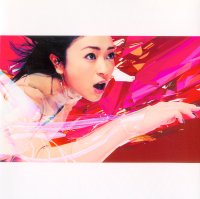
"Traveling" is a song recorded by Japanese–American recording artist Hikaru Utada. It was released as the second single from her fourth studio and third Japanese language album, Deep River (2002). The track was written and composed by Utada, whilst production was handled by Utada, her father Teruzane Utada, and long-time collaborator Akira Miyake. Musically, "Traveling" is a dance-pop song, influenced by house music. Lyrically, it discusses human activities and dreams.
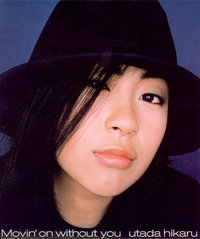
"Movin' On Without You" is a song recorded by Japanese–American singer and producer Hikaru Utada taken from their debut studio album First Love (1999). The song was written, arranged, and produced by Utada themselves, and it became their first ever hit. "Movin' On Without You" was written, produced and composed while Utada was attending college in Tokyo, Japan, during 1997. Utada, who received a record contract by Toshiba-EMI, had written an English-language version of the song, but the song remains unreleased.
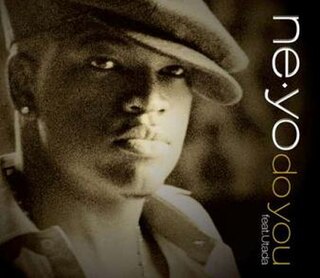
"Do You" is a 2007 single by American singer-songwriter Ne-Yo. It is about Ne-Yo questioning his ex-girlfriend if she ever thinks about him anymore. It is the second single from his second album, Because of You. The single was officially released to radio the week of June 12, 2007. In an interview with BET, Ne-Yo said that "Do You" is the second part to his song "So Sick" from his debut album, In My Own Words.

"Kiss & Cry" is a song recorded by Japanese American recording artist Hikaru Utada for their seventh studio and fifth Japanese album, Heart Station (2007). It was written, composed, and arranged by Utada, whilst production was handled by Utada, their father Teruzane Utada, and Akira Miyake. The single premiered on May 31, 2007 as the third single from the album in Japan. It was re-released as a double A-side single with "Beautiful World", which also appeared on the parent album on August 29 in Japan, and digitally worldwide. Musically, "Kiss & Cry" is an R&B song, influenced by pop and hip-hop music. Lyrically, it discusses both Utada's upbringing and social beliefs between both Western and oriental regions.

Heart Station is the seventh studio and fifth Japanese-language album by Japanese–American recording artist Hikaru Utada. It was released on March 19, 2008, by EMI Music in Japan, and globally on March 26, 2008. It is Utada's eighth consecutive studio album to be fully written and produced by her, with the help of her father Teruzane Utada and long-time collaborator Miyake Akira through the production. Recorded between 2006 and 2008, it was worked on whilst she was recording her ninth studio and second English-language studio album, This Is the One (2009). With the album artwork photographed by Japanese photographer Mitsuo, Heart Station was released in two formats: a physical CD, and as a digital download.

"Come Back to Me" is a pop and R&B song by Japanese American pop singer Hikaru Utada, released under the mononymous moniker Utada. The song was written by Utada and Stargate and was produced by Utada, Stargate and her father, Sking U. "Come Back to Me" is the first single from her second English-language album This Is the One. In the United States, the song has peaked at number five on the Billboard Hot Dance Club Play and number 69 on the Pop 100 chart.

This Is the One is the third English studio album by Japanese American pop singer-songwriter Utada, released by Island Records in the United States digitally on March 24, 2009 and physically on May 12, 2009. The album was originally set to be released in Japan on March 4 but was pushed back to March 14. The album was only released in North America, Japan and some parts of Asia. In Japan, the album topped the Oricon's International Album chart and peaked at number three on the Weekly chart. In the United States, the album peaked at number 69 on the Billboard 200 chart. This Is the One was the supporting album of Utada's 2010 tour Utada: In the Flesh 2010. On December 21, 2009, the "Dirty Desire" remixes were released.

"Goodbye Happiness" is a song by Japanese American singer-songwriter Hikaru Utada. It was released as the lead track from Utada's second Japanese compilation album, Utada Hikaru Single Collection Vol. 2, in November 2010. The song was commercially successful, topping Billboard's Japan Hot 100 chart in December 2010, and in January 2011 was certified gold by the RIAJ for more than 100,000 full-length downloads to cellphones.

"Devil Inside" is Hikaru Utada's second English single, released under the name Utada. It is the second single from Exodus, and the first physical single released in the United States. Though it gained little mainstream attention, "Devil Inside" did do well on dance radio and hit number 10 on the Billboard Hot Dance Airplay chart, making it Utada's most played track in the United States until it was surpassed by "Come Back to Me".
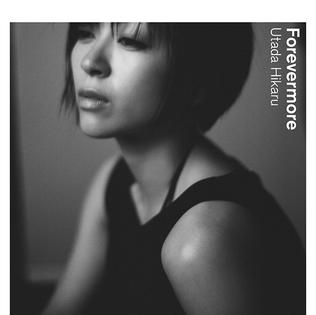
"Forevermore" is a song by Japanese American singer-songwriter Hikaru Utada. It is their second single under the label Epic Records, from their upcoming seventh Japanese-language studio album, Hatsukoi. The song was used as a tie-in for TBS dorama Gomen, Aishiteru, their first single used in a drama of a commercial TV station since "Eternally " in 2008. It features the renowned drummer Chris Dave.

Dirty Work – The Album is the debut studio album by American singer-songwriter Austin Mahone. The album was released on October 18, 2017, by AM Music and Mr. 305 Inc. through Universal Music Japan and was only released in Japan. The album features guest appearances from Bobby Biscayne, Juicy J, Pitbull, 2 Chainz and Hardwell.

"Face My Fears" is a song by Japanese-American singer-songwriter Hikaru Utada and American record producer Skrillex, released on January 18, 2019, by Epic Records Japan. Along with its English-language counterpart, it serves as the opening theme song to the Square Enix video game Kingdom Hearts III. It was written as a collaboration between Utada, producer Skrillex, and R&B songwriter Poo Bear.

One Last Kiss is an extended play by Japanese musician Hikaru Utada, which was released in the US on March 9, 2021. It was released for promotion of the Japanese animated film Evangelion: 3.0+1.0 Thrice Upon a Time around the time of the film's release. It contains all the previously released theme songs that were made for the Rebuild of Evangelion film series. It also contains the theme song "One Last Kiss", which was co-produced by A. G. Cook and released in conjunction with the film on March 10, 2021.



















